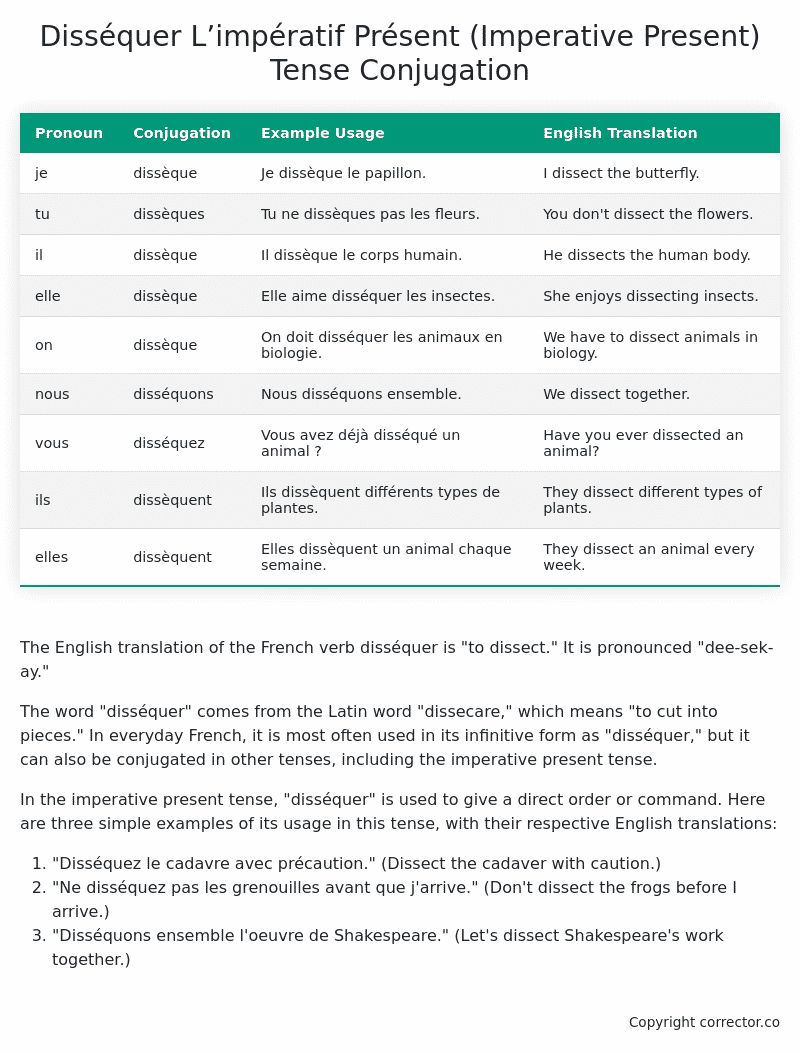L’impératif Présent (Imperative Present) Tense Conjugation of the French Verb disséquer
Introduction to the verb disséquer
The English translation of the French verb disséquer is “to dissect.” It is pronounced “dee-sek-ay.”
The word “disséquer” comes from the Latin word “dissecare,” which means “to cut into pieces.” In everyday French, it is most often used in its infinitive form as “disséquer,” but it can also be conjugated in other tenses, including the imperative present tense.
In the imperative present tense, “disséquer” is used to give a direct order or command. Here are three simple examples of its usage in this tense, with their respective English translations:
- “Disséquez le cadavre avec précaution.” (Dissect the cadaver with caution.)
- “Ne disséquez pas les grenouilles avant que j’arrive.” (Don’t dissect the frogs before I arrive.)
- “Disséquons ensemble l’oeuvre de Shakespeare.” (Let’s dissect Shakespeare’s work together.)
Table of the L’impératif Présent (Imperative Present) Tense Conjugation of disséquer
| Pronoun | Conjugation | Example Usage | English Translation |
|---|---|---|---|
| je | dissèque | Je dissèque le papillon. | I dissect the butterfly. |
| tu | dissèques | Tu ne dissèques pas les fleurs. | You don’t dissect the flowers. |
| il | dissèque | Il dissèque le corps humain. | He dissects the human body. |
| elle | dissèque | Elle aime disséquer les insectes. | She enjoys dissecting insects. |
| on | dissèque | On doit disséquer les animaux en biologie. | We have to dissect animals in biology. |
| nous | disséquons | Nous disséquons ensemble. | We dissect together. |
| vous | disséquez | Vous avez déjà disséqué un animal ? | Have you ever dissected an animal? |
| ils | dissèquent | Ils dissèquent différents types de plantes. | They dissect different types of plants. |
| elles | dissèquent | Elles dissèquent un animal chaque semaine. | They dissect an animal every week. |
Other Conjugations for Disséquer.
Le Present (Present Tense) Conjugation of the French Verb disséquer
Imparfait (Imperfect) Tense Conjugation of the French Verb disséquer
Passé Simple (Simple Past) Tense Conjugation of the French Verb disséquer
Passé Composé (Present Perfect) Tense Conjugation of the French Verb disséquer
Futur Simple (Simple Future) Tense Conjugation of the French Verb disséquer
Futur Proche (Near Future) Tense Conjugation of the French Verb disséquer
Plus-que-parfait (Pluperfect) Tense Conjugation of the French Verb disséquer
Passé Antérieur (Past Anterior) Tense Conjugation of the French Verb disséquer
Futur Antérieur (Future Anterior) Tense Conjugation of the French Verb disséquer
Subjonctif Présent (Subjunctive Present) Tense Conjugation of the French Verb disséquer
Subjonctif Passé (Subjunctive Past) Tense Conjugation of the French Verb disséquer
Subjonctif Imparfait (Subjunctive Imperfect) Tense Conjugation of the French Verb disséquer
Subjonctif Plus-que-parfait (Subjunctive Pluperfect) Tense Conjugation of the French Verb disséquer
Conditionnel Présent (Conditional Present) Tense Conjugation of the French Verb disséquer
Conditionnel Passé (Conditional Past) Tense Conjugation of the French Verb disséquer
L’impératif Présent (Imperative Present) Tense Conjugation of the French Verb disséquer (this article)
L’infinitif Présent (Infinitive Present) Tense Conjugation of the French Verb disséquer
Struggling with French verbs or the language in general? Why not use our free French Grammar Checker – no registration required!
Get a FREE Download Study Sheet of this Conjugation 🔥
Simply right click the image below, click “save image” and get your free reference for the disséquer L’impératif Présent tense conjugation!

Disséquer – About the French L’impératif Présent (Imperative Present) Tense
Usage
Giving commands
Making requests
Offering advice
Expressing desires
Conjugation Formation
Interactions with other tenses
Want More?
I hope you enjoyed this article on the verb disséquer. Still in a learning mood? Check out another TOTALLY random French verb conjugation!


